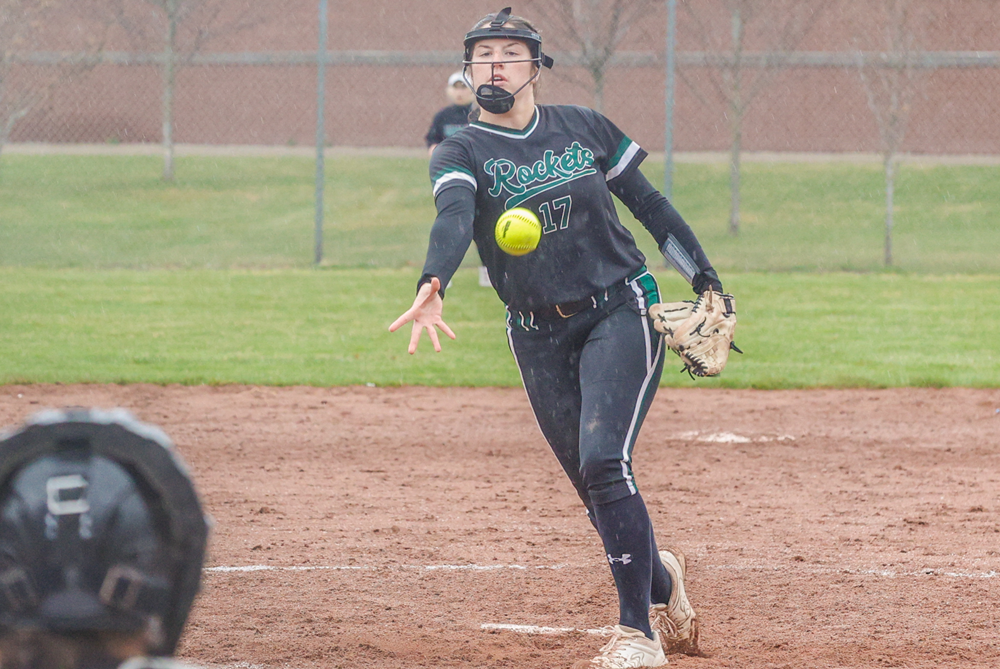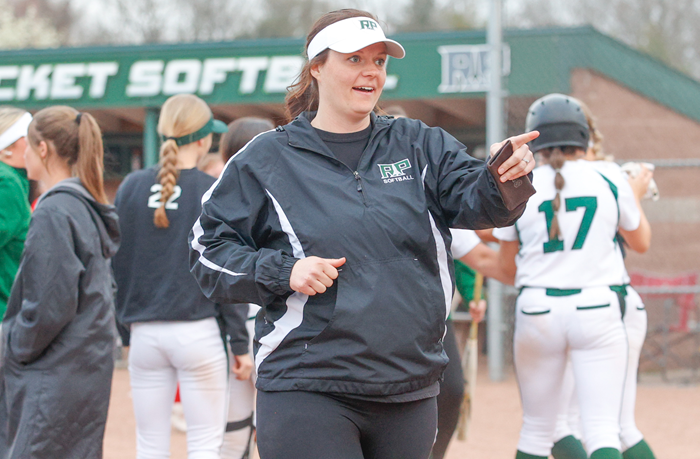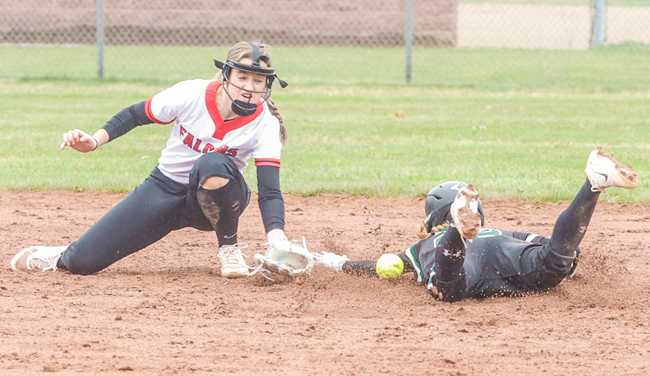
Powerful Voice for High School Sports
December 19, 2014
By Geoff Kimmerly
Second Half editor
Paul Carey was home from the U.S. Army only a few months and just shy of 25 years old when Beal City embarked on its first trip deep into the MHSAA boys basketball tournament.
On the call for local radio station WCEN from gyms at Saginaw Arthur Hill and Lansing Sexton, Carey served as the voice of the previously “laughable” Aggies as they reached the Class D Semifinals before falling just six points short of playing for the title.
“All of Beal City emptied out. They’d never had anything before,” Carey recalled during his annual Thanksgiving weekend visit to the MHSAA Football Finals at Ford Field. “When I got home, within the next two weeks I got a letter from every citizen of Beal City thanking me for broadcasting their games. That’s the kind of appreciation that meant so much.”
During 42 years on the airwaves, Carey was best known as a voice of the Detroit Tigers bounding out of transistor radios all over Michigan, thanks to WJR’s powerful signal.
But for the state’s high school sports community, his legacy is similarly memorable as the voice of the longtime football and basketball scoreboard show and a voter for various all-state teams and wire polls over the decades.
Now 86 and retired since 1991, Carey remains a regular during the first day of the Football Finals, taking in games he broadcast for the MHSAA during the late 1970s and that continue to hold his eye as they have for more than a half-century.
“It was a passion of mine. High school sports always has been,” Carey said. “I think because my dad was a high school coach, and teacher initially, and my brother was a high school coach and teacher, I just grew up in families that appreciated coaching and athletics. I was not a great athlete, but it kept my hand in following sports that way.”
Now, the scores
Carey partnered with Ernie Harwell for Tigers radio broadcasts from 1973-91, including during the march to the 1984 World Series championship. He was named Michigan Sportscaster of the Year six times and to the Michigan Sports Hall of Fame in 1992.
But Carey’s early career included sitting on top of a car, plugged into a phone pole, for a Sacred Heart football game at old Fancher Field just a few blocks from his family’s Mount Pleasant home. Among many more accolades are a Distinguished Service Award from the Michigan High School Coaches Association and a place in the Basketball Coaches Association of Michigan Hall of Fame.
In fact, the start of his weekly announcing of statewide football and basketball scores preceded his baseball career by 16 years and ended two months after he announced his final professional out.
The Michigan High School Scoreboard show was a staple of WJR’s late Friday nights from 1957-91. Carey would read every score he could collect from a variety of sources, often organized by league and with state rankings and context mixed in.
His idea came from something similar read by Len Colby for Kalamazoo’s WKZO. Carey’s brother Terry was coaching at Niles during the second half of the 1950s, and he and other coaches would get together to listen to the Friday night scores from the southwestern part of the state.
Carey, who left WKNX in Saginaw for WJR in 1956, explained to then-sports director Bob Reynolds that the station’s strong signal could provide for a truly statewide scoreboard experience.
Carey then connected with Edgar Hayes of the former Detroit Times, who gave the OK for Carey to call the paper on Friday nights to get scores from the Detroit metro area. For the rest, Carey relied on wire services – there were three at the time – who relied on newspapers from all over Michigan to call in scores over the course of an evening.
Before every Friday during high school football season – and later Tuesdays and Fridays during boys basketball season – Carey typed up lists of games based on schedules in the newspaper, with spaces to add scores. More than a few times, Carey raced down a back ramp at Tiger Stadium after a Friday night game, back to the WJR studio, with 15 minutes to prep for the show’s 11:30 p.m. start.
“If the Flint Journal, the Grand Rapids Press, the Traverse City paper didn’t call in scores to the AP, then I was out of luck too. And that happened all the time,” Carey said. “I would call back occasionally, say, ‘Did you get anything more?’ It was a rat race.”
The show originally was set for 10 minutes and then extended to 15. American Airlines sponsored a record show that followed, and Carey’s scoreboard show had a sponsor only once in 35 years. Finishing up on time was expected, even with more than 200 scores to read.
But Carey said he always went 20 minutes, sometimes 25.
“Because I wasn’t done. I just kept right on going,” Carey said. “Jay Roberts did the all-night show most of the time, and he was patient with me. He didn’t say too much on the air about ‘that guy ahead of me took all of my time.’”
Carey continued the “rat race” until his final scoreboard show, Dec. 20, 1991. He retired from WJR at the end of that calendar year. And it's important to note: Carey was never paid a dime extra for doing the program. .
“I think Paul is really just a sports fan, and that came across to the listener on his broadcasts,” MHSAA historian Ron Pesch said. “Paul would gather as much as possible off the wire. He'd interject if scores were missing from sections of the state. Press polls from the Free Press, News, AP and UPI were big, so he could point out close calls and upsets.
“He provided immediacy, or the closest thing to it in the days before cable TV and the Internet, and because of his scoreboard show, you could get the results before the morning paper. For listeners, he brought life to something as simple as game scores.”
First team all the way
Carey, who resides in Rochester, also served as the engineer on Tigers broadcasts for 16 years, through 1990. He broadcast Pistons games on the radio for six seasons and did the first broadcast of a Central Michigan University football game, in 1949.
Harry Atkins, covering Detroit’s teams while with The Associated Press for 29 years including the last 21 as its sports editor for Detroit, took note of his colleague's hard work – and especially that Carey was one of few broadcasters who was a journalist in addition to a voice.
That made Carey's other major role in high school sports a natural fit.
Atkins split The Associated Press all-state selection panels for football and basketball into 11 regions, and Carey represented the Detroit area for a number of years. He also was a longtime voter in those sports' weekly polls.
“Paul is just that kind of guy. He thought it was important and he made time in his busy schedule to do it,” Atkins said “And it had an impact on the other 10 voters on the All-State panels, too.
“Some of them were from small out-state newspapers or radio or TV stations. Yet every one of them knew who Paul Carey was. And when he spoke, of course, with what often is called "The Voice of God," those voters paid attention.”
And he still does, as well.
At the end of each fall, Carey still puts together a compilation of the three high school all-state football teams – Associated Press, Detroit Free Press and Detroit News – and files them with years of research and results.
“It’s important to me. Nobody sees it but me, but I get a certain kick,” Carey said. “Once in a while I’ll see a kid playing at Central, Western or (Michigan) State or Michigan, and they’ll say he came from Clawson. I’ll go into my all-state collections, say that would’ve been 2009 he played, and I find a name.”
In addition to the Football Finals on WJR, Carey was part of the Baseball Finals broadcasts into the early 1990s, continuing to contribute even after his retirement from his fulltime gig.
He spent high school games over the years sitting next to legends like the Free Press’ Hal Schram and remembers when current Free Press longtime scribe Mick McCabe was just a rookie. One of Carey's final broadcasts was a 1992 Baseball Final with his nephew Mike Carey, who continues to broadcast MHSAA championship games to this day.
“I am eternally grateful to Paul Carey. His contribution to high school sports in Michigan has been great and significant,” Atkins said.
“We are lucky to have him.”
PHOTO: Paul Carey (left) and nephew Mike Carey broadcast the MHSAA 1992 Class D Baseball Final between Hillman and Athens for PASS.

'No Superstars' Reeths-Puffer Undefeated, County Tournament Favorite Entering May
By
Tom Kendra
Special for MHSAA.com
May 1, 2024
Natalie Kunnen is in her fourth year as a varsity softball player for Muskegon Reeths-Puffer, but she has never experienced anything remotely close to this team’s vibe.
 Not only are the Rockets unbeaten at 20-0-1, but no deficit seems too big to overcome.
Not only are the Rockets unbeaten at 20-0-1, but no deficit seems too big to overcome.
Puffer rallied to beat Holton and later scratched out a tie with Allendale, then last week pulled a rabbit out of their hat twice in one night – coming back from a four-run deficit in the opener and a nine-run deficit in the nightcap in an improbable sweep at powerhouse Muskegon Oakridge.
“I walked out of Oakridge just stunned and asking myself, ‘Who are we?’” said Kunnen, who swings one of the biggest bats in the lineup with three home runs and 22 RBIs. “There is a completely different feel this year.”
Who are these Rockets?
They remained a rare unbeaten more than one month into the season after a sweep of host Grand Rapids Union on Tuesday, setting the stage for a doubleheader tonight at state power Hudsonville, followed by Saturday’s Greater Muskegon Athletic Association Tier 1 tournament – where the Rockets are both the host and the No. 1 seed.
They are a team devoid of a superstar, but also without a weak link.
 “We don’t have an easy out in our lineup, 1 through 9, and that is something that makes us unique,” said coach Sarah Bayle, 28, a 2013 Reeths-Puffer graduate who went on to play at Muskegon Community College and Ferris State.
“We don’t have an easy out in our lineup, 1 through 9, and that is something that makes us unique,” said coach Sarah Bayle, 28, a 2013 Reeths-Puffer graduate who went on to play at Muskegon Community College and Ferris State.
“We have speed that we try to use to our advantage and three different pitchers who all bring something different.”
The Rockets adopted that “no superstars” mantra earlier this season after athletic director Cliff Sandee stopped by a practice and gave the huddled team an impromptu pep talk.
“He have us our motto: ‘It’s not who’s best on the team, it’s who’s best for the team,’” said junior pitcher and first baseman Mady Snyder. “We really believe that. We have a lot of grit. There is not one person on this team who gives up and says we’re done.”
Puffer sprints out of the gate behind the speedy trio of Kaylee Jones, Lainey McDaniel and Abbie Critchett at the top of the order – a threesome who have 61 of the team’s 90 stolen bases.
That trio sets the stage for the big bats of Snyder (three home runs and a team-best 26 RBIs), Kunnen, Megan Barnes and Kyleigh Bilek.
Puffer, which has outscored its opponents 216-53, is batting .406 as a team, with eight of the 13 players batting .400 or better. Leaders in that category are McDaniel at .558 and Snyder with .474.
The Rockets have played in only one tournament thus far, winning April 20 at Hamilton.
Bayle, who is officially in her fifth year as R-P’s coach but looks at it as her fourth year after COVID wiped out the 2020 season, said one of the turning points in the program came at the start of the 2021 campaign.
“We brought up four freshmen to the varsity, which is something that just wasn’t done much here,” said Bayle, who is assisted on the varsity by Kat Hyder, Sydney Recknagel, Scott Huebler and Chris Bilek. “That sparked a new reality. It doesn’t matter what year you are, you can’t slack off or someone could take your place.”
 Those four freshmen are now the team’s only four seniors – Kunnen, Jones, Barnes and Emme Buzzell.
Those four freshmen are now the team’s only four seniors – Kunnen, Jones, Barnes and Emme Buzzell.
The closest thing to a star for the Rockets this spring has been McDaniel, a crafty left-handed pitcher who has a 0.85 ERA in 41 innings of work. Her improvement from freshman year to this spring as a sophomore has been remarkable, Bayle said, and a big reason for the remarkable start.
McDaniel and Jersi Bilek are the sophomores on the varsity roster, which also includes freshman Tessa Ross. The future looks bright as R-P also boasts an unbeaten junior varsity team, coached by Cody Jacobs.
Bayle, who is seven months pregnant with her second child, knows that much tougher challenges lie ahead, starting with Wednesday’s showdown at Hudsonville (a team which she believes R-P has never beaten in softball).
One of the team’s biggest goals this spring is to win this Saturday’s county tournament and then the Division 1 District, two tournaments which haven’t been kind to the Rockets in recent years.
This year, Puffer goes into the county tournament as the heavy favorite in its pool, with big wins over fellow Pool 1 teams Muskegon Mona Shores and Holton. Should they emerge from that group, the Rockets would likely face revenge-minded Oakridge or two-time reigning county champion Ravenna.
“We haven’t done good in the county, and haven’t made the finals in the past three years,” said Kunnen. “We’ve been really young, but this year we have a lot of juniors and seniors and a lot of leadership.
“I can’t even tell you how amazing it would be to win it my senior year.”
 Tom Kendra worked 23 years at The Muskegon Chronicle, including five as assistant sports editor and the final six as sports editor through 2011. E-mail him at [email protected] with story ideas for Muskegon, Oceana, Mason, Lake, Oceola, Mecosta and Newaygo counties.
Tom Kendra worked 23 years at The Muskegon Chronicle, including five as assistant sports editor and the final six as sports editor through 2011. E-mail him at [email protected] with story ideas for Muskegon, Oceana, Mason, Lake, Oceola, Mecosta and Newaygo counties.
PHOTOS (Top) Madi Snyder delivers a pitch for the Muskegon Reeths-Puffer, which has been led by the 1-2 pitching duo of Snyder and Lainey McDaniel. (Middle) Rockets coach Sarah Bayle has guided her team to an 18-0-1 start, with many of the wins coming in dramatic, come-from-behind fashion. (Below) McDaniel slides safely into second base during a game against Allendale. (Photos by Joe Lane.)

